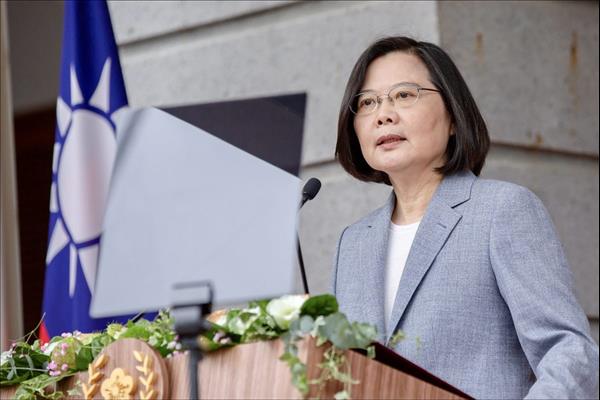
Disinformation And Democratic Resilience In Taiwan
Beijing hopes to convince Taiwanese citizens that the only way to avoid war is to support its plans peacefully to unify Taiwan with mainland China.
Taiwan's robust democracy is underpinned by freedom of speech, press and association – liberties that China seeks to exploit to spread disinformation. In the past few years, numerous CPC-backed campaigns have targeted Taiwan's commercial news outlets and social media landscape.
False stories are often generated by content farms – websites that produce large quantities of low-quality content designed to place highly on search engine results – then republished in Taiwanese media and amplified by state-sponsored accounts.
The CPC's messaging has evolved over time. Pro-unification rhetoric has lessened while content purporting to be from local citizens, written in the traditional Chinese characters commonly used in Taiwan and claiming to care about Taiwanese politics and society, has increased.
For the CPC, such disinformation remains a cost-effective method to interfere with Taiwanese electoral politics. Ahead of the 2020 presidential election, the CPC spread falsehoods about President Tsai Ing-wen forging her doctoral thesis, leading to the London School of Economics releasing a statement refuting the claims.
After the election, Chinese disinformation campaigns tried to discredit Tsai's victory and claimed it was manipulated by the US Central Intelligence Agency.
China's disinformation also aims to increase political polarization and sow public discord. In 2018, Chinese media outlets amplified criticisms that Taiwanese diplomats were unable to evacuate Taiwanese citizens from Osaka, Japan, during a typhoon and spread falsehoods that Taiwanese citizens had to claim they were Chinese to be evacuated.
During the Covid-19 pandemic , Chinese state-sponsored actors spread disinformation about Taiwan's Medigen vaccine and tried to discredit officials with fake stories about not complying with“social distancing” rules.
China's attempts to bring taiwan closer to the mainland via political co-optation and preferential economics have largely failed , especially after the passing of Hong Kong's national-security law discredited the CPC's“one country, two systems” framework.
Beijing will increasingly rely on what President Tsai has called “cognitive warfare” – the use of“false information to create disturbance in the minds of the people.”
This cognitive warfare is deployed alongside near-daily cyberattacks, drone flights and military exercises around Taiwan. Regular use of these tactics aims to wear down Taiwan's military and civil reactions, as well as to undermine public trust in Taipei's ability to protect its citizens.
Disguising fake and misleading news as Taiwanese-produced content could reduce Taiwanese citizens' abilities to discern fact from fiction and weaken social trust in Taiwanese news outlets.
But as China's efforts have evolved, so too have Taiwan's responses. Civil-society organizations such as taiwan factcheck analyze public-interest issues, cofacts runs a crowdsourced platform for Line, and doublethink lab maintains a set of tools to counter conspiracy theories and propaganda.
Volunteer-led organization fakenewscleaner holds media literacy workshops to help distinguish misleading information.
Such civil-society initiatives are needed because of the vulnerability of Taiwan's deregulated commercial media landscape, in which many media shareholders have business interests with mainland China.
Introducing laws to penalize those that spread false information are unlikely to have a deterrent effect because of the length of time it takes to detect malicious actors and to prosecute them in Taiwanese courts.
Taiwan's Ministry of digital affairs has also introduced a range of measures to combat disinformation. This includes the g0v civic hacking program and a bilingual Google assistant chatbot for Taiwan's Center for Disease Control.
One of the most effective approaches continues to be“humor over rumor ,” in which fake news is reposted on social media with humorous memes, such as a shiba inu dog , explaining the facts.
Most of these initiatives are based on Taiwanese Digital Minister Audrey Tang's belief that technology should strengthen democracy by ensuring open data, transparency and accountability tools.
This approach also recognizes that Taipei cannot counter Chinese state-sponsored disinformation through excessive regulation of Taiwan's digital landscape or by limiting freedom of expression. Such moves would weaken Taiwan's democratic credentials , which are critical to demonstrating that the island is a distinct polity from mainland China.
In 2022, public criticism led to a law proposed by the Tsai administration to fine Internet platforms for failing to remove harmful content being shelved. Since the bill would have put government agencies in charge of defining disinformation, it was perceived as an attempt by the government to punish critical content and restrict Internet participation.
The same criticism was leveled by opposition parties at President Tsai for proposing amendments last month to the General Mobilization Act. The changes would allow the government to enforce wartime controls on information in the digital, broadcasting and publishing domains, and those found responsible for spreading disinformation could face up to three years in jail.
Beijing's attempts at economically coercing and militarily intimidating Taiwan into accepting unification will continue to be accompanied by attempts to polarize taiwanese society .
Understanding how Taiwan balances robust oversight and regulation, high civic participation and diverse media will also be critical for other countries seeking to counter Beijing's interference in democratic processes beyond Taiwan.
This article was first published by East Asia Forum, which is based out of the crawford school of public policy within the college of asia and the pacific at the australian national university . It is republished under a Creative Commons license.
Like this:Like Loading...
Legal Disclaimer:
MENAFN provides the
information “as is” without warranty of any kind. We do not accept
any responsibility or liability for the accuracy, content, images,
videos, licenses, completeness, legality, or reliability of the information
contained in this article. If you have any complaints or copyright
issues related to this article, kindly contact the provider above.






















Comments
No comment